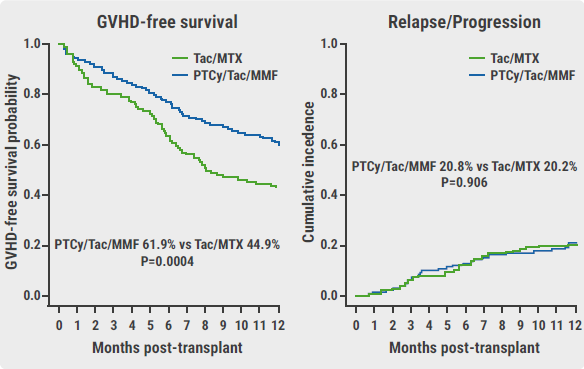Prof. Mark Walters (University of California, CA, USA) presented up to 8 years of follow-up efficacy and safety data of 63 patients with TDT who received beti-cel infusion therapy [1]. Transfusion independence was defined as a haemoglobin (Hb) level ≥9 g/dL without packed red blood cell transfusions for ≥12 months.
The peripheral blood vector copy number (VCN) per cell was stable and durable over time, especially in phase 3 studies, in which patients received optimised beti-cel infusion doses. Similarly, total Hb levels and therapy-derived HbA-T87Q levels were stable and durable (mean of approximately 12 g/dL and 9 g/dL) for patients who were included in phase 3 studies. Prof. Walters showed that the effect was independent of age and genotype. Furthermore, an exploratory analysis suggested that a percentage of 62% transduced cells increased the likelihood of achieving transfusion independence. Finally, 19% of the patients in phase 3 trials had ≥1 adverse event (AE) possibly related to beti-cel infusion therapy. Hepatic veno-occlusive disease occurred in 11% of the patients, but these events were resolved after treatment.
In another presentation, Prof. Franco Locatelli (University of Rome, Italy) reported the 3-year follow-up data of the LTF-303 study (NCT02633943), that investigated patient-reported outcomes in patients with TDT who received beti-cel infusion therapy (n=57) [2]. For patients who had reached transfusion independence, the SF-36 physical component score and mental component score were 55.7 and 56.3 at 3 years, which was a raise from the baseline levels of 53.8 and 50.9, respectively. A slight drop in SF-36 scores was observed in patients who had not achieved transfusion independence. In paediatric patients who reached transfusion independence (n=22), the mean PedsQL total score increased from 78.3 at baseline to 90.6 at 3 years. For those who did not achieve transfusion independence, no change in mean PedsQL total score was reported. Three years after treatment, data showed positive trends in employment/employment seeking rates (67% to 93%), school absence (95% to 50%), and physical activity (+81% improvement).
Thus, durable transfusion independence and quality-of-life improvements were reported in patients with TDT who received beti-cel infusion therapy.
- Walters MC, et al. Long Term Outcomes of 63 Patients with Transfusion-Dependent β-Thalassemia (TDT) Followed up to 7 Years Post-Treatment with betibeglogene autotemcel (beti-cel) Gene Therapy and Exploratory Analysis of Predictors of Successful Treatment Outcomes in Phase 3 Trials. Abstract 2348, ASH 64th Annual Meeting, 10–13 December 2022, New Orleans, LA, USA.
- Locatelli F, et al. Long-Term Patient-Reported Outcomes Following Treatment with betibeglogene autotemcel in Patients with Transfusion-Dependent β-Thalassemia. Abstract 3665, ASH 64th Annual Meeting, 10–13 December 2022, New Orleans, LA, USA.
Copyright ©2023 Medicom Medical Publishers
Posted on


